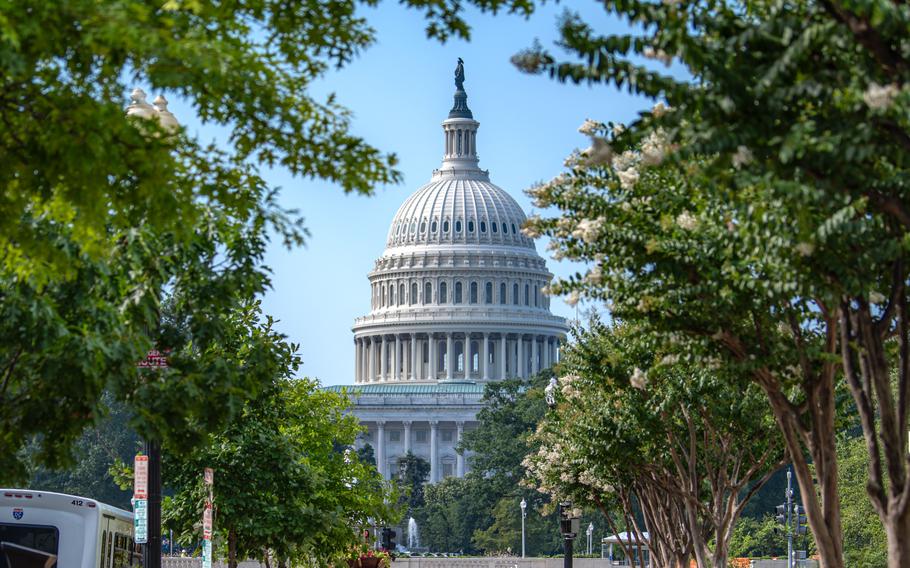
The U.S. Capitol is seen July 13, 2023, in Washington, D.C. Leaders from veterans organizations speaking at a Brookings Institution event Monday, Nov. 6, 2023, said many veterans are interested in finding ways to continue serving their country as civilians. (Carlos Bongioanni/Stars and Stripes)
WASHINGTON — A shortage of 120,000 poll workers to staff voting places in 2022 prompted a national outreach to veterans groups asking members whether they might help.
More than 36,000 veterans in 12 hours signed up. After 24 hours, the number topped 63,500 veterans offering to work at polling places in their communities on Election Day. Assistance offered by veterans cut the need by more than half — and in many cases ensured polling stations opened and operated.
Ellen Gustafson, who leads We the Veterans and Military Families, a nonpartisan organization, offered that anecdote at a Brookings Institution event Monday focusing on veterans and civic engagement. The discussion at the Washington think tank looked at the continuing interest by many former service members to keep serving their country after their time in the military ends.
“We saw that when veterans are called to serve again, they do so and in large numbers. That showed us the incredible opportunity for engaging our veteran community in all the different realms of civic service,” Gustafson said.
The two-hour Brookings event looked at the benefits and opportunities for military veterans to have a greater role in civic engagement and bridging political divides.
The discussion underscored how the background and experience veterans bring in “safeguarding American democracy” might point to a greater desire for supporting democratic activities at home.
Moderator Michael O’Hanlon, son of an Army doctor, said veterans and their families “bear the brunt” of decisions by national leaders for the U.S. to engage in conflicts.
“They are the most invested and informed about those decisions. We should want their voices heard,” he said.
But William Galston, a Marine Corps veteran and senior Brookings fellow, said veteran interest in civic service is no longer reflected by a higher proportion of former service members in Congress.
“Veterans have a unique contribution to offer to American society and to politics. But their contribution has diminished sharply in our lifetimes,” he said. As example, he noted 80% of the Senate was represented by veterans 50 years ago. It is now 17%.
Jeremy Butler, a Navy reservist and chief growth officer at We the Veterans and Military Families, was on active duty in Iraq and Afghanistan before transitioning to the Reserve.
A focus of his work at the nonpartisan organization is showing veterans and their family members how they can continue to contribute as civilians “to get things done.”
He said many Americans are not grounded in civics and his organization strives to raise awareness with veterans about “how much we need to do in educating people” about civic participation in U.S. democracy and how to get involved.
Jennifer Morrell, an Air Force veteran, talked about her motivation launching The Elections Group, a nonpartisan organization that works with cities and states to assure best practices in election administration.
“I had a desire to give back to my community and continue to serve,” said Morrell, who in 2020 started The Elections Group.
The nonprofit now has 20 employees who train and support election administrators at the local and state level on the mechanics of running polling places. The organization also does outreach to improve voter education.
Morrell sees a greater role for veterans to bring their specialized background in security and skills as leaders and decision-makers.
“For those leaving the military and looking for a next step, there is a nice fit between military work and work in local and state election offices,” she said.
Gustafson said her organization is encouraging veterans groups to see how voting and polling stations work.
We the Veterans and Military Families recently hosted an educational event at a polling place in New Hampshire.
“We simply invited military veterans to be poll workers,” Gustafson said. “It is a paid position, but it is voluntary. You are doing a service to your country.”